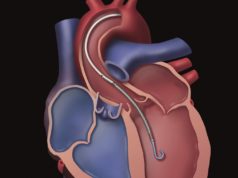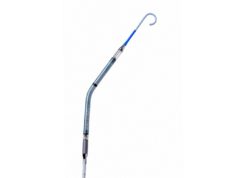
A new analysis of data from the Impella (Abiomed) Quality (IQ) Database shows a relative increase of 24% in mean survival in acute myocardial infarction cardiogenic shock patients since Impella’s cardiogenic shock FDA post-market approval. Part of the reason for the increase was a near doubling in the number of hospital centres achieving a greater than 80% survival to explant. These data presented at the 2018 Transcatheter Cardiovascular Therapeutics (TCT) meeting (21–25 September, San Diego, USA) William O’Neill (Henry Ford Hospital, Detroit, USA).
The analysis is based on 11,566 acute myocardial infarction patients with cardiogenic shock treated with Impella between April 2015 and June 2018 from Abiomed’s IQ Database. The IQ Database is a collection of observational, quality assurance data on more than 95% of Impella patients since the Impella heart pump’s introduction to the USA.
From the IQ Database, three best practices were identified and adopted into treatment protocols at a growing number of hospitals through the physician-led National Cardiogenic Shock Initiative (NCSI). The best practices include placing Impella before percutaneous coronary intervention (PCI), reducing use of inotropes, and use of hemodynamic monitoring.
Separately at TCT, O’Neill also presented initial data from the first 104 patients treated with the NCSI protocol. The data showed a 77% survival to discharge with 99% native heart recovery. The NCSI protocol includes placing Impella pre-PCI, reducing the use of inotropes, and right heart haemodynamic monitoring.
O’Neill, comments: “This real-world evidence shows an unprecedented increase in survival outcomes for acute myocardial infarction cardiogenic shock patients and is a result of the increased adoption of best practices for treating cardiogenic shock.” He adds: “We are seeing this improvement only a year and a half after these best practices were identified and championed. In my career, I have not before seen this kind of rapid change of outcomes in interventional cardiology. Historically, survival rates for acute myocardial infarction cardiogenic shock have stagnated around 50%. The adoption of these best practices and the improvement in cardiogenic shock outcomes for so many patients is incredibly gratifying.”
Michael R Minogue, chairman, president and chief executive officer of Abiomed, says: “Taken together, these two data analyses demonstrate how best practice protocols give us hope for improving survival rates in cardiogenic shock. Abiomed is committed to advancing clinical research and innovation to improve outcomes for our patients and send them home with their native heart.”












